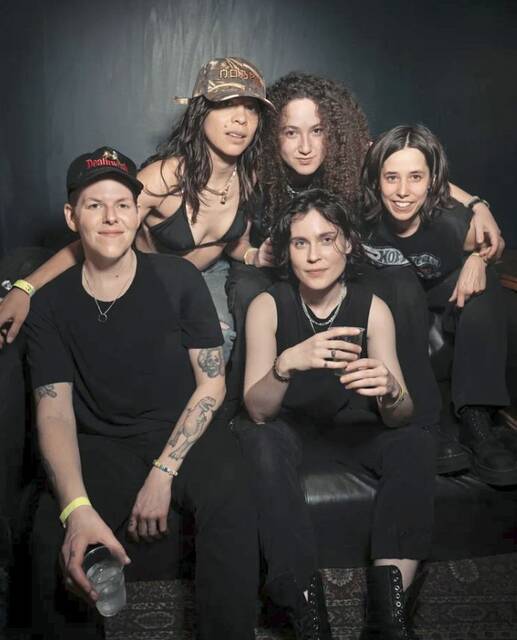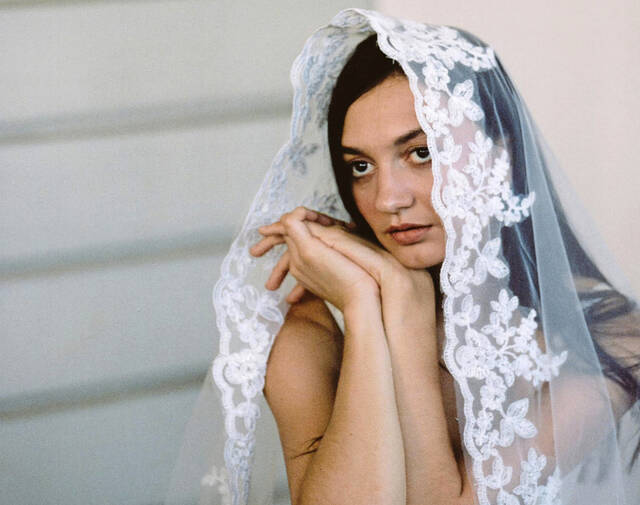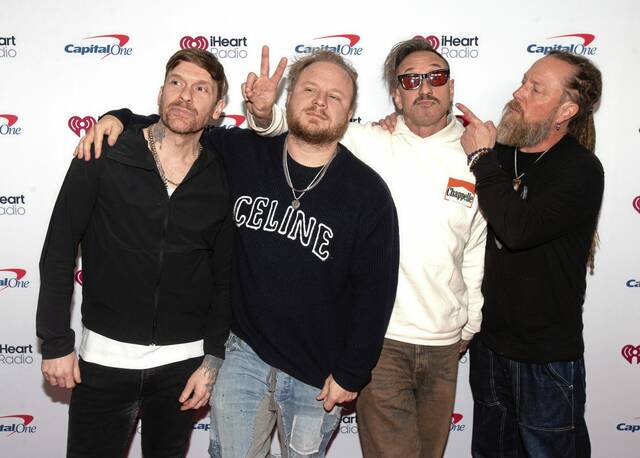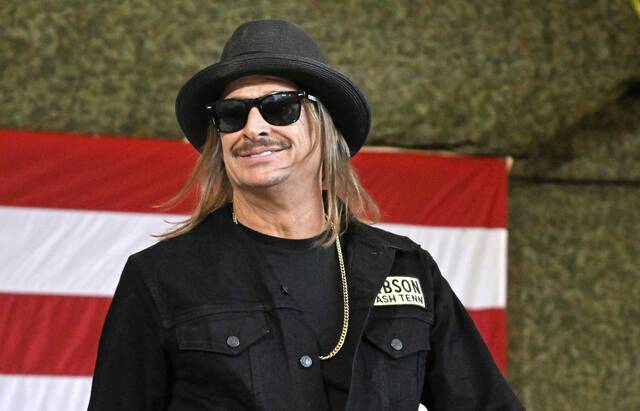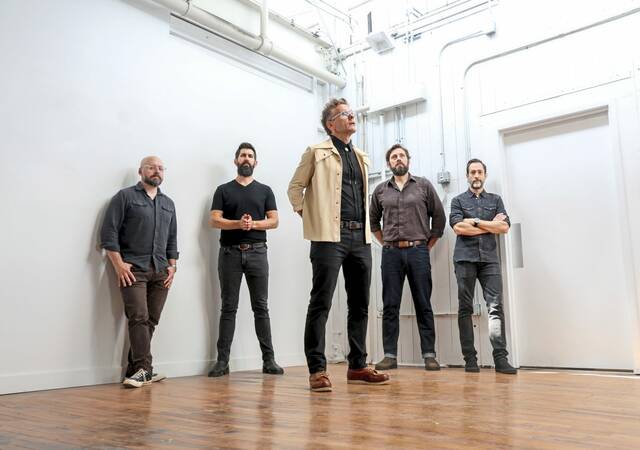In the course of 30 years touring the world with Sleater-Kinney, singer/guitarist Corin Tucker has learned that things don’t always go smoothly.
Take, for instance, Thursday night, when the band’s bus lost power and air conditioning on the drive from Nashville to Michigan, requiring a late-night vehicle exchange.
“They really do not tell you about living on a bus,” Tucker said Friday afternoon from Detroit. “You find out later. It’s in the fine print.”
Provided there are no issues with their new bus, the indie rock pioneers will hit town for a show Monday night at Mr. Smalls Theatre in Millvale. Sleater-Kinney — comprised of Tucker and guitarist/singer Carrie Brownstein — are touring in support of their 11th studio album, “Little Rope,” which came out on Jan. 19.
With singles like “Hell,” “Say It Like You Mean It” and “Untidy Creature,” the band has racked up appearances on “The Tonight Show Starring Jimmy Fallon,” “Jimmy Kimmel Live!” and NPR’s Tiny Desk concert series in the six months since the album’s release.
“I think we’re very proud of the album, and we’ve really enjoyed how people connect to the songs live. And I think some of the songs we really expected to be fun to play live, but I don’t know that we really knew how great they were going to be. And then other ones, it’s like, for whatever reason, there’s one song that absolutely does not work live, and I don’t know why,” Tucker said with a laugh. “But that’s the fun part, you get to road-test what you’ve created. It’s like you engineer the songs and you have an idea in your mind of how they’re going to go live. And I think most of the time we’re right, and just sometimes we’re not. And that’s what’s interesting about being a songwriter.”
(That song that didn’t work? It appears to be “Six Mistakes,” which they dropped from their setlist in April. “Honestly, I think it’s my fault because I kept playing it wrong,” she said.)
Tucker discussed her (brief) roots in Pennsylvania, her family, the tone of “Little Rope,” songwriting goals and more:
Looking at Wikipedia, I saw that you were born in State College, Pennsylvania.
It’s true.
How long did you live there?
Only until I was like one and a half or two. My dad was a Ph.D. student at Penn State and then he got a job in North Dakota at their psychology department, so we didn’t stay that long. But I do have some really cute baby photos from living in student housing at Penn State.
So did you grew up to be a Penn State fan or did that just kind of fall away?
I mean I’m a fan of every university that my father either attended and my mother either attended or taught at because he taught at (the University of North Dakota) and the University of Oregon. So I like them all.
Speaking of your family, I was just wondering how important they were in nurturing your interest in music at a young age.
Definitely a huge part of my relationship to music. My dad was like a hobby musician. And so he opened for Pete Seeger once. He was like a folk musician in the ‘60s. And we always would sit around playing guitar and I would always sing and he would teach me all the Pete Seeger songs and folk songs. I always thought that’s what families just did, sit around and play music or listen to music.
Did you do the same thing with your kids then?
We definitely listened to music, but technology was so different by the time I had kids that, you know, we were driving around and listening to music in the car, and they both have played music in their lives. I just don’t think either of them want to be musicians. Probably has something to do with living on a bus, I think. (laughs) Because they’ve seen that.
Obviously, things are different now, but just looking back a little bit, do you feel like there are more doors open for female musicians than when you first started?
Yeah, I mean, definitely things have changed in terms of the sort of acceptance in different gender roles and how many more women are in the music industry and really taking charge and running their own careers. I think that’s great, you know? It’s a lot different.
With the album, starting it with the the track “Hell,” do you think that really set the tone for the record, of what people should expect out of it?
Yeah, I mean I think that we were really trying to create a world that was dark and reflected sort of what is going on in the country today, in terms of the violence that we live with every day, the division and the human toll that takes. I think we wanted to have an emotional response to what we’re living through and give ourselves a moment to say, like, is this really how we want to live? I think that asking those questions is part of, I think, what you can do as an artist, what I like to do. And so that’s why we started the album that way is to really not mess around and just take the listener into the sort of like dark reflection, this mirror world that we were making.
With all these songs, there are some tough times that happened during the writing of this album. Is there an emotional toll with performing these songs or is that something that you sort of are able to put to the side?
I think that we’ve performed songs that touch on the darker aspects of things we’ve gone through. But I think that the thing about writing a song like that is it transforms when you play it live. And when you put it with other songs, it becomes a different thing. I think that’s definitely true of this record, that it has a transformative power of taking what you’re going through and bringing it to the light makes it a lot easier to carry around. I think that the letting go of it is really joyful and I think you see that joy in our live shows.
With your songwriting, do you have a goal of expressing something personal but maybe also relatable to other people at the same time who haven’t gone through what you’ve gone through?
Absolutely. I think that’s the whole point of being a storyteller, to tell your own story and then have other people experience a little bit of your world and experience other people’s worlds as you listen to other people’s stories. I think that’s kind of the human exchange that happens with art that we’re hoping for, and it makes us all, I think, more empathetic to what other people are going through.
Related
• Chevelle drummer Sam Loeffler discusses new album, label and more ahead of Pittsburgh show• Interview: Pittsburgh-born Craig Burletic does double duty as bassist for Tyler Childers, El Dorodo
• 2024 Pittsburgh area concert calendar
Do you feel like people get entitled to know what every song is about? How do you decide what to keep private and what do you share?
I think that we kind of feel it out, and I think that it depends on the person and what they’re going through and what the conversation is. I’m also from the school of like, why would we want to explain what every song is about from our perspective? Because it might ring, it might reach someone in a totally different way … Like even the song “Hell,” that song can have a lot of different meanings for people. And that’s good. That’s translating it into other people’s experience. And we don’t want to dictate what every song is about for people. If they want to know what we were thinking about when we were writing it, sure, we can get into that. But I would rather people just take in the record on their own and interpret it for themselves.
You and Carrie have been together as a band for 30 years. Did you ever think that you’d be doing it this long?
No. (laughs) Definitely not. That wasn’t something we were planning on, but I’m very grateful to still be playing music with her, and I’m really happy that we made this record. I think it’s a good one.
The show in Pittsburgh that you’ll be doing will be the first of six nights in a row. How do you get through a run like that?
That’s a really good question. (laughs)
I hope I didn’t give you bad news there.
No, no, we knew it was coming but great question, not entirely sure I have the answer. I think everyone tries to eat as healthily as possible and walk and do the vocal warm-ups and drink lots of water and not get dehydrated, but it’ll be a lot, yeah.




